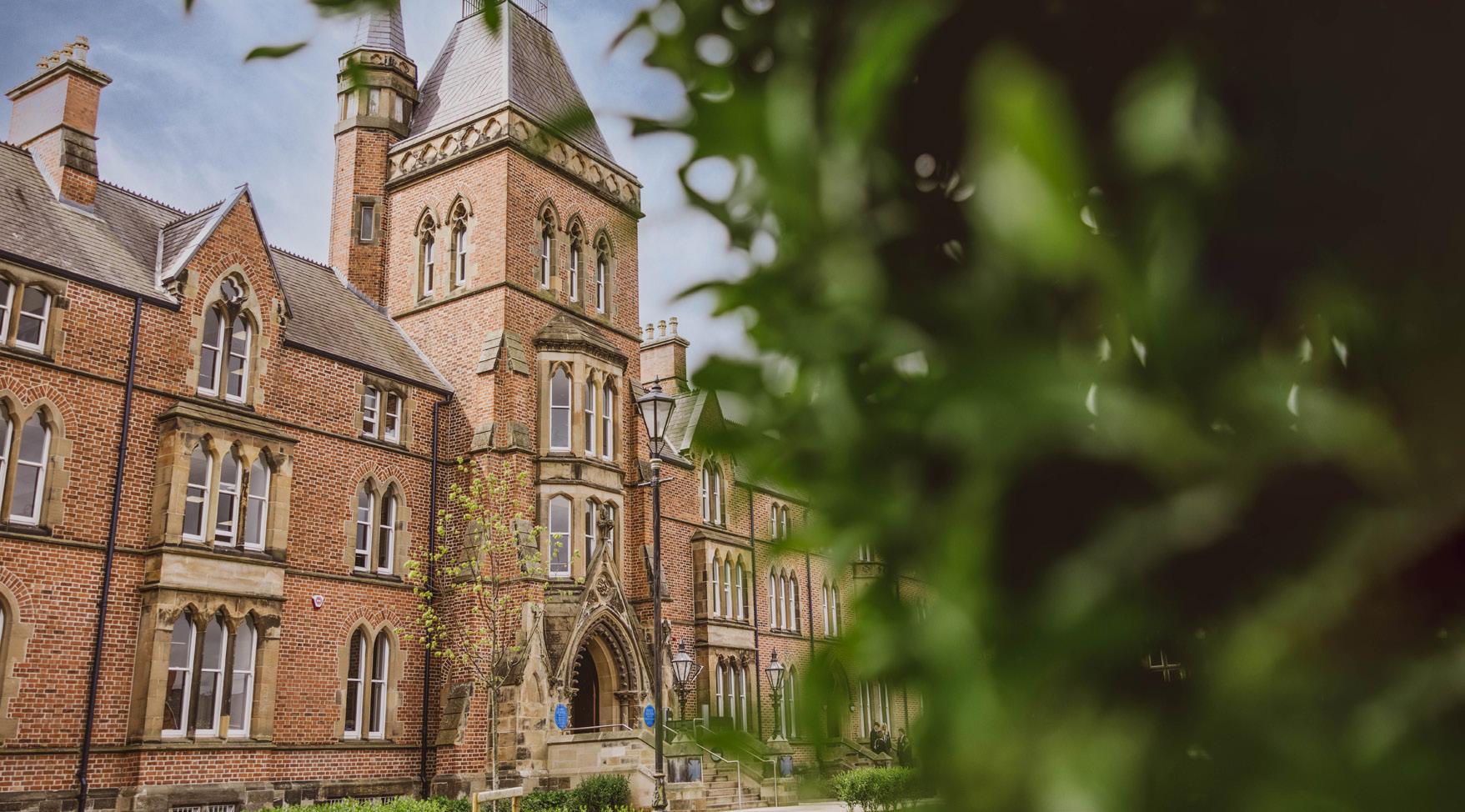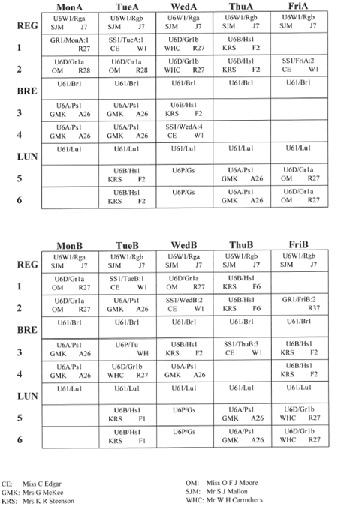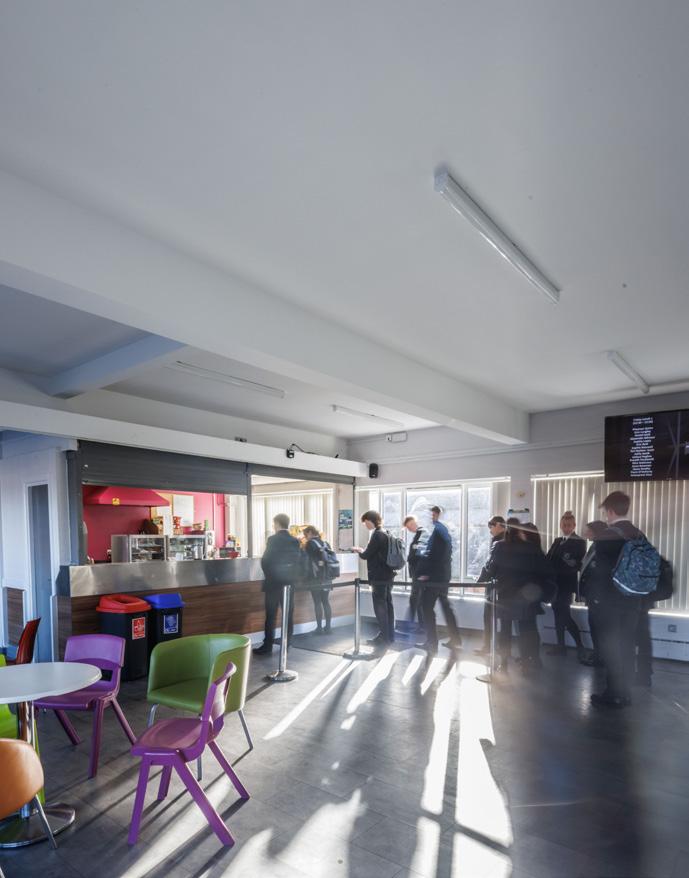LOWER SIXTH INDUCTION
AUGUST 2025



AUGUST 2025


I would like to extend you a very warm welcome to Sixth Form. There are many changes and adaptations to make as you progress from GCSEs to A Levels, but don’t let that scare you. Our hope for all of you is that you leave Methody after Sixth Form not only with excellent grades but also with the skills and qualities that you need to prepare you for life after school.
At Methody, we will provide you with opportunities to develop leadership skills, both inside and outside of the classroom. We will challenge you to become a more independent learner, so that you take leadership of your own learning pathway, to equip you for the challenges you will face in the future and enable you to compete for university places and in the job market locally, nationally or internationally.
At Methody, we are proud of the diversity of our student body. We expect all students to respect themselves and others, to look for the good in others and to be honest and trustworthy. We want to make sure that every student feels valued and safe, and we expect our Sixth Formers to take lead role in this.
The Form Team is here to support you throughout the next two years:
Head of Lower Sixth
Deputy Head of Lower Sixth
Head of Pastoral Care for Sixth Form
Warden of the Sixth Form Centre
Mrs Callaghan
Mr McKee
Mrs Parker
Mr Gallagher
At Methody, we work hard to unlock potential and develop talent in all of our students. We aim for excellence, not only in academic subjects, but also in the many extra-curricular activities that we offer, including sport, music and drama. Choose to get involved and take every opportunity you can to improve your leadership and communication skills. I look forward to working with you over the next two years and I hope that you achieve great things here at Methody.
Mrs McKee Head of Senior School
WEDNESDAY 27 AUGUST
9.30am - 1.30pm - Induction Session - New Lower Sixth Only. Chapel of Unity
THURSDAY 28 AUGUST
9.30am - 2.30pm - Activity Day - meet at Pirrie Park. Being packed lunch or buy lunch there.
FRIDAY 29 AUGUST
11.30am - 1.30pm - Whitla Hall
School begins for all Lower Sixth students on Monday 1st September 2025, with tutor group at 8.45 a.m. in the rooms below. Please be punctual. You will remain in your groups periods 1 and 2. Class will begin period 3 week B.
L6P Dr A Moore S2 L6V Mrs F MciLwaine J6
Miss J Richmond J2 L6W Mr N Thompson [TuWTh] Mr P Kirk [MF] J7
Miss L Anderson J3 L6X Mrs U McGlinchey N6
L6S Mr R Bleakley J4 L6Y Mr W Carrothers
L6T Mr J Lowe J5 L6Z Mrs A-M Drumm N9
You will be part of a Tutor Group and will have a Tutor who you will meet with at the beginning of every day for Registration at 8.45 am. At 8.55 am, you will either go to Assembly or stay in Tutor Group until 9.10 am before going to Period 1.

School finishes at 3.15pm Monday to Friday.
Breaktime Lunch
Ps: Psychology
GMK: Mrs McKee
A26: Classroom

All Sixth Form students are expected to aim for 100% attendance. An attendance record of 90% may seem pretty good, but if you add up the time involved it would mean that you have missed up to 4 weeks of lessons over the course of an academic year. Educational research has shown that an attendance record of 90% or less can reduce your results by up to one grade per subject.
Registration takes place at 8:45 every day in your tutor group room. Tutor group lasts until 9:10 except for an assembly day when tutor group finishes at 8:55.
We expect that you will be in school throughout the normal school day and that you will make every reasonable effort to arrange appointments outside school hours. A register of attendance is also taken for every lesson by your subject teachers and Miss Edgar or Dr Tracey on the Study Floors. Absenting yourself from class without permission will be treated as a serious offence and will result in you being given a Stage 2 detention.
All students are expected to attend tutor group every morning. Various music groups and sports teams will have rehearsals or practices before school and this may necessitate you missing tutor group. If you need to attend a rehearsal or practice on a particular morning each week, you must inform your tutor and arrange to see them regularly to get any important information.
In Lower Sixth, you have permission to leave school at lunchtime, but only at lunchtime, not at break or during free periods. Any student who leaves school at other times, without permission, will be given a Stage 2 detention.
If you have a part-time job, the school recommends a maximum of 8 hours working per week, preferably at weekends. Experience shows that students who undertake long hours of paid work during the week underperform in their academic studies. You are not permitted to be in paid employment between the hours of 08:40 – 15:15, Monday to Friday, except during school holidays. School is your chosen full-time occupation!
Many absences which you know about in advance are acceptable, but they still require formal permission from the school. This includes:
• A medical/dental appointment which could not be arranged outside school hours.
• Religious holiday.
• Interview or visit, e.g. University interview or Open Day.
• Significant extra-curricular activity, such as music, drama or sport events not organised by the school.
• Attendance at a funeral.
• Severe disruption to your normal mode of transport.
• Driving test (this does not include driving lessons or the theory test).
Your parent/guardian should request permission in advance for a part-day absence by sending an email via the SchoolGateway app or via Schoolscom.
Please address the email FAO Mrs Callaghan or Mrs McKee to request permission for a whole-day absence or several days’ absence.
Parents do not have the right to take their child out of school for travel, except in exceptional circumstances when the school may choose to grant authorisation for leave of absence. Permission should be sought from the Vice Principal, Mrs McKay.
Students arriving too late for registration must sign in with in A Block at Rolls and Records office. If you are persistently late, the Form Tutor will speak to you and sanctions will be issued. You are also required to sign out of school at Rolls and Records if you have to leave during the school day, for a medical appointment for example. If you are returning to school before the end of the school day, you must also sign back in at Rolls and Records .
These are absences due to illness or other unforeseen circumstances. We expect your parent to send a text message via the SchoolGateway app or Schoolcomms or to telephone Mrs Stewart on 90205226 between 8:30 and 8:45 on each day of the absence. If this does not happen, your parent will be contacted by text via the Schoolcomms system. The SchoolGateway or Schoolscom message from your parent/ guardian is accepted as a note and therefore avoids the need for a written note.

EMA is a weekly allowance of £30 to help 16 – 19 year olds with the cost of Sixth Form education. Depending on your family’s financial circumstances, you may be entitled to receive it. Please note, EMA is a ‘something for something’ policy – you have to earn your EMA payments by signing an EMA Learning Agreement and achieving objectives linked to attendance, school work and behaviour. Poor attendance, punctuality or behaviour could result in a loss of payment for that week. The full EMA Policy can be found on the College website.
You can collect an information pack and application form from Mrs Allen-Antuna in M2½. Complete the application online or return the form to the address given on the application. Once you receive a letter of confirmation, go to M2½ to sign a Learning Agreement.
In Methody, we aim to support the personal, social, emotional and intellectual needs of every student, so that everyone can participate fully and gain maximum benefit from everything the school has to offer. You may have been lucky enough to sail through Forms 1 – 5, never needing any extra help or support. This will hopefully continue in the Sixth Form. However, unforeseen events can have a major impact on your life and may affect how you feel in school. There will be different issues, pressures and responsibilities in Sixth Form and sometimes students need a helping hand, or just someone to listen to their concerns without passing judgement. If you have any concerns at all, it is important to speak to a member of staff to find out how we can help.
Confidentiality is always a priority. However, if you have a concern about something which might result in serious harm being caused to you or another student, our duty of care means that we must pass the information on (but only to a small number of relevant people) to ensure that you will be kept safe.
Mrs McKee Head of Senior School
A26, Psychology or HoS Office, H7
Mrs Parker Sixth Form Pastoral Care A17, English or Pastoral Care
Mrs Callaghan Head of Form R34, Languages
Mr McKee Deputy Head of Form T4, Technology
Mrs McGlinchey Form Tutor K2, History
The School Nurse Eileen Carleton The San (back of A block)
Mrs Cooney Head of Pastoral Care Pastoral Care
Mrs McKay VP (Pastoral Care) Mrs McKay’s Office is in A Block.
If you are worried or upset, don’t ignore the problems in the hope that they will disappear. Please speak to a member of staff.
In addition, we can arrange sessions on site with an independent, professional counsellor from Familyworks. Counselling may help you to understand what you think, feel and do; to weigh up your alternatives and options, make your own decisions and act upon them.
Remember – we can’t help unless we know you have a problem. If you talk to us, you might be surprised at the help we can offer.

The Worrall Centre is our Sixth Form Centre. The centre covers four floors and caters for student needs by providing:
• Large Recreational floor (‘The Rec’), with Coffee Bar, and other recreational spaces on the bottom floor
• Two study floors with computer
• Locker areas. Speak to Mr Gallagher or Miss Edgar if you would like a locker.
The Worrall Centre allows our Sixth Form students a degree of independence. Even though you are still very much part of the school, you gain a little distance from the younger pupils. It is a place where our senior students can start to assume greater responsibility for their own work and free time so that they can make the transition from school to university life more easily.
The Sixth Form Centre is run by a Forum of Sixth Form students, under the guidance of a small number of members of staff who help with the day to day running of the Centre. Sixth Form students are expected to cooperate fully both with staff and the members of the Forum and treat the Centre with respect. Any failure to comply will have consequences, ranging from a warning to exclusion from the Centre for a period of time.
• Mr Gallagher is the Warden of the Sixth Form Centre.
• Mr Finlay is the Deputy Warden of the Sixth Form Centre.
• Miss Edgar and Dr Tracey are the Study Supervisors.
The Coffee Bar is open from 9 a.m. until the end of lunchtime. It serves tea, coffee and some hot food.
Sixth Formers are also allowed out of school at lunchtime (but only at lunchtime), so you can get lunch at one of the many shops or cafes nearby, either to eat there or to bring back to the Rec Floor.

Students should make maximum use of their study periods. Experience has shown that success at A Level depends on consistent effort. You will find more advice on how to make the most effective use of study time on pages 11 – 14.
Study periods are treated as a timetabled class. Attendance is compulsory. You can also make use of the Study Floors during free periods if there is room.
A register is called at the start of each period and students must stay for the duration of the class. Silence is to be maintained on the Study Floors at all times. Please respect the need of others to work in silence. Use of the computers should be for school work only. Students are not permitted to eat or drink on the Study Floors, with the exception of water.
Permission to miss a Study period must be sought in advance. Written notes from appropriate teachers must accompany any request and should be given to Miss Edgar or Dr Tracey prior to the study period in question. Failure to attend a study period or leaving early will be considered as being absent without permission and will result in a sanction issued by Mrs McKee, Mrs Callaghan or Mr Finlay.
• A plastic wallet/folder or small file for daily school use, with labelled dividers for different subjects and teachers. Use this for the work that you are currently doing in each subject.
• At home, one ring binder or lever arch file per subject, to put notes into once you have completed a topic.
• The specification for each A Level subject. Look on the exam board website and print off a copy for your file.
• Dividers for your folders.
• Pens, pencils, rubber, ruler, highlighter pens.
• Calculator for relevant subjects.
• A memory stick.
• A diary, either a mobile device or a paper copy. You can get a copy of the school homework diary, if you want one, in the first few days.
The Sixth Form Forum assists with the daily running of the Centre and organisation of key events for Sixth Form. Its role is to encourage each student in Sixth Form to get involved in school life and ensure that the Worrall Centre is treated with respect. Serving on the Sixth Form Forum is an excellent opportunity for students to develop leadership skills, use initiative, motivate others and make a positive impact.
The Chairperson and the rest of the Forum work with, and are accountable to, Mr Gallagher and Mr Finlay. The Forum is made up of 35 students; some are selected (the Senior Prefects) and some Lower Sixth students are elected through a vote by the student body. Elections are held in September of L6. The Forum meets once per term to discuss issues which are relevant to Sixth Form.
There is also an Executive Committee which consists of the Chairperson of the Forum, the Secretary, the Coordinator of each section and the Head Boy and Head Girl. The Forum is divided into sub-committees which play a key role in the smooth running of the Sixth Form Centre.

The Prefects in Methody assist the staff with the smooth running of the College by undertaking supervisory duties and (where possible) helping with academic subjects and extra-curricular activities. In Lower Sixth, students act as Assistant Prefects by contributing in the above areas and beginning to develop and display their leadership potential. Later in the year, all Assistant Prefects will be offered the chance to apply for the position of Prefect in the College.
GCSEs are over. Two years of hard work has hopefully translated into some good grades. Next up is A Levels, and how different can they be, really? Most of you are taking your A Levels in the same school, with many of the same teachers, there are exams at the end, so it can’t be that much different, right? Wrong! Yes, there are some similarities, but actually the jump from GCSE to A Level is quite a large one. So large, in fact, that it catches a lot of students out and they fall into the gap. By the time they climb out of it, the chance of them doing well has been seriously reduced. So what can you do to be successful at A Level?
You’ll study far fewer subjects. Most of you studied 10 GCSE subjects, some you really liked, some you didn’t care for, and some you hated. Now you’re down to 3 or 4 subjects, all of which you chose. That means you get more lessons on those subjects and, for the first time, actual real-life free periods!
At GCSE it may have seemed that you already had quite a lot of content to commit to memory. At A Level, the content you need to learn is multiplied significantly. So learning and revising as you go along will make your life much easier. As well as more information to learn, you actually have to be able to understand it. At A Level, there’s much more emphasis on the skills of analysis and evaluation, rather than just recalling what you have memorised.
You’ll probably find that those short 15-30 minute homework tasks that you used to get won’t really exist at A Level. Instead, you’ll be expected to do more independent study, unofficial ‘home-work’, which means reading around the topics that you’re learning about in class, reviewing the notes you’ve made and checking that you understand them. The expectation is that you should be spending 4 to 5 hours per week per subject doing this. This won’t be checked, you won’t have to hand it in, so it’s entirely your responsibility to do it. So why bother? If you do, you’ll have a much better chance of doing well in your A Levels. If you’re smart about it, you can get a lot of this ‘home-work’ done in school, during Study periods.
Please remember, your days of compulsory schooling are over – you have chosen to return to Sixth Form to study A Levels. You need to make the most of your time in school, otherwise what was the point in coming back? If we see that you are not trying your best, we will have a conversation with you to check that you are still happy with the choice that you made or whether you would be better leaving and trying something else.
The jump from GCSE to A Level is a huge transition. So fully take on board that a big shift is coming your way. Be open to the changes this will cause. Be ready to embrace the challenge and the opportunities for both learning and personal growth that this step-up represents. And don’t be scared to ask for help if you need it.
Organisation is crucial from now on. You need to keep careful track of deadlines, keep your notes really well organised (and complete) and bring everything with you every day that you will need. Get into a routine that incorporates plenty of study time. Use ‘To Do’ lists to help maximise your productivity and prioritise tasks.
A big part of the step-up to A Level is being prepared to do the work. If you’re one of the lucky people who sailed through GCSEs without doing much work, then you’re in for a big shock. A Levels are hard work for everybody. If you want to leave Methody in two years with grades to be proud of, you can’t leave the work until Easter of Upper Sixth. You need to start doing the work on day 1 and keep it up throughout the two years.
When you first see your timetable, with ‘free’ periods in the middle of the school day, it can be tempting to use them to chat to your friends. Much of your ‘free’ time at school should be thought of as ‘study’ time. You will have some official Study periods that you must attend, like any other timetabled class, but you can make use of the Study Floor at other times too. Assign a couple of study periods per week for each subject. Plan ahead, in your diary, what you need to work on in that time and what tasks you want to get done.
It may not seem like it’s much use revising something that you just learned that day, especially if the exam is months or even years away. But research has shown that reviewing information regularly helps you embed it in your memory. After a class, read up on what you learned to consolidate your new knowledge. Make flashcards with short snippets of the key information from each topic. These will be useful when you come to revise, days or even months down the line. Ask for help from your teacher if you still don’t understand it properly.
A Level is all about understanding. There is no better way to check that you understand something than to try to explain it to someone else – a family member, someone you know who doesn’t take that subject, or whoever. If they get it, the chances are you do too.
The difference between a hardworking student who gets A’s and A*’s and one who gets C’s and D’s is how well they think like an examiner. Try past paper questions and ask your teacher to mark them. Take on board any feedback they give you to help you understand where you need to improve. Then use the mark scheme to help you learn to recognise what a good answer looks like.
Sixth Form is a time when you’ve finally left behind the subjects you disliked at GCSE and you’re now able to concentrate on subjects that genuinely interest you. What’s more, you’re working towards studying your favourite subject at University or College. Although A Levels are harder work than GCSEs, you’ll hopefully find that you really enjoy Sixth Form and the new challenges it brings. It’s a time to make new friends and have a more active social life. Enjoy it and remember that all this hard work will pay off, even if it doesn’t always feel like it at the time.
I AM HAVING ISSUES WITH A PARTICULAR SUBJECT?
I AM STRUGGLING WITH THE DEMANDS OF AS LEVEL?
You have chosen 3 or 4 subjects for A Level. Sometimes, one subject may not turn out as you expected. Give it a chance, but if you really feel it isn’t for you, talk to Mrs Callaghan and she will explain what can be done. We will require a note from your parents, so make sure you discuss your problem at home. We try our best to accommodate a change, but it is always subject to timetabling.
Talk to your subject teachers and ask for their advice. Then talk to one of the Form Team. We are here to help. We might offer you a system of mentoring, where one teacher will help you to come up with short term targets and design a Study Plan. Don’t ignore things and hope that they will magically get better by themselves.
I HAVE A FREE PERIOD IN THE MORNING?
I HAVE NO HOMEWORK AND HAVE A STUDY PERIOD?
All L6 students must be in for registration at 8.45 a.m. every morning and are only allowed out of school at lunchtime. So if you have a free period early in the day, use the time to study. Assign one of these periods to each subject and use the time to read ahead or review work done that day.
There is lots you can do. Consolidate work done in class, read ahead on future topics, do some research, get a start on coursework.
I’M NOT SURE WHAT I WANT TO DO AFTER SIXTH FORM?
I DRIVE TO SCHOOL?
MY FINANCIAL SITUATION IS IMPACTING MY STUDIES?
I AM FEELING ILL DURING THE SCHOOL DAY?
Speak to Mrs Stott or any other member of the Careers Service. All L6 students will be assigned a UCAS tutor later in the year, to help guide you through the process of University applications. There will be information during the year from different Universities and you will get advice about UCAS and personal statements.
If you are lucky enough to pass your driving test and have access to a car, you might want to drive to school. Leave plenty of time. Parking is a bit of a nightmare. College Gardens is normally full by about 7.45 a.m. ‘I couldn’t find a parking space,’ is not an acceptable excuse for being late to tutor group. You are not allowed to bring your car into school to park in the school grounds. You are not allowed to bring your car into school to park in the school grounds.
Speak to Mrs McKee or Mrs Allen-Antuna in M2½. She processes the paperwork for EMA (Educational Maintenance Allowance). See page 7 for more details.
Speak to your subject teacher and ask to go to the San. The school nurse may be able to give you medicine (e.g. painkillers) to help. If you are too ill to remain in school, she can speak to your parents and give you permission to leave. You could also speak to Mrs Callaghan or Mrs McKee. You must not leave school without permission.
I HAVE ANY OTHER CONCERNS OR WORRIES DURING MY TIME IN SIXTH FORM?
Speak to any member of the Form Team (look at the lists on page 3 and 4) or any other teacher that you feel comfortable talking to. We are all here to help ensure that everyone feels safe and happy here at Methody.